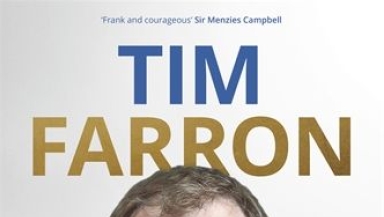Tim Farron opened about his career in politics and his Christian faith at the launch of his book, A Better Ambition, in Westminster on Tuesday night.
As thousands of protesters vented their frustration about Brexit and the imminent prospect of no deal outside the Houses of Parliament, inside the former Lib Dem leader was speaking about his new book, published by SPCK, which calls for society to come together to build a new kind of politics away from what he sees as the current "bitter, unpalatable extremes".
During his tenure as leader of the Lib Dem party, Mr Farron came under immense pressure over his Christian beliefs and specifically his views on homosexuality, eventually resigning from his position. It's a subject he touches on in his book.
He writes on the subject: "[...] I don't spend half my life simmering with disapproval over what people do in their sex lives.
"I still feel pain at the assumptions behind the repeated questions I was asked about gay sex – pain that people look at me and think I am uncomfortable with or dislike people because of their sexual orientation, and that I must see them differently or care for them less."
He goes on to write that in the face of repeated questioning about his Christian views and being typecast as a "religious nutter", he resorted to telling journalists that his faith was a "private matter", something he said later made him feel like "such a weakling".
"The questions I have been asked by journalists most often are 'Do you pray?', 'Do you pray for Theresa May?' and 'Did you ask God's will before you did X?'" he writes.
"Having sometimes answered these questions with an innocent response – which is usually some version or other of 'Yes' – it became clear that these questions are often asked for a sensational write-up, which inevitably ends with my being made to look like some kind of pious, otherworldly weirdo.

"So, I learned to say that my faith was a private matter to avoid that line of questioning," he admits.
It was a subject he addressed further at his book launch last night, where he expressed some regret that he hadn't been more open about his faith.
"It felt like a good, short-term 'straight bat' to a difficult ball to say my faith was a private matter, but in reality, it's not true," he said.
"Because everybody in this room, whatever their faith position, has a worldview [...] and it would be really odd if the only people who had to leave their worldview at the door were the ones who have an established religious faith."
Reflecting on the philosophical ideas of the great liberal John Stuart Mill, Mr Farron said he feared that a "tyranny of opinion" was emerging and suggested that the Lib Dems should be the party to defend the freedom of belief.
"The tyranny of opinion really troubles me," he said.
"In other words, you're not going to be legislated against but essentially social pressure means that you must think 'x' or must not think 'y'.
"And I think that's really bad," he said, adding that society should "not decide to snuff out those who are an inconvenience".
Asked during a Q&A whether he felt able to share his faith with his fellow Lib Dems while leader of the party, he replied: "I think one of my main failings, looking around at colleagues, is that I didn't share it with them enough."
He went on to say that "part of the problem" for politicians "is this assumption that faith is merely a private matter whereas everything else can be talked about publicly".
Despite this, he said it was "not that difficult" to be a Christian in politics and that he did not feel his experience over the 'gay question' - given his many years as a successful MP and time as party leader - was evidence of a "glass ceiling" for Christians.
He challenged Christians to still consider entering into politics, saying that they needed to counter two temptations, one being "to hide" and the other "to blend in", while also admitting that he had been guilty of the latter.
"I think if there's a glass ceiling, it's reasonably high," he said.
READ MORE:
Tim Farron: Christians in politics can't leave their faith at the door
Tim Farron and the gay sex question: Is there hope for Christians in politics?
Tim Farron says he was wrong to deny gay sex was sinful













